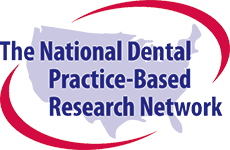Frequently Asked Questions
Dental practitioners across the U.S. are joining the network every day. There are over 8,500 dentists, hygienists, and other professionals in the network.
You need internet access and email at your office or home. Internet access will be an important part of the research process. There is no fee to enroll and there is no membership fee. You can participate in research projects that benefit your practice with participation at one of three levels depending on your interest: 1. informational (receive newsletters and correspondence only); 2. limited (also participate in questionnaires); or 3. full (also participate in in-office clinical studies).
The benefits from participation are numerous. Our goal of creating a win-win relationship between research and practice drives our effort to generate personal and professional benefits for you and your patients. Dental practitioners in the network tell us that participating has allowed them to:
- Increase their practice’s visibility and stature among dental patients
- Distinguish their practice from other practices (acts as a practice promoter or practice builder) Receive financial remuneration for the time spent doing research
- Enhance communication with patients by showing that they care about the scientific basis of clinical practice (they “stay current”)
- Improve the quality of dental care by contributing to the scientific basis for the dental procedures that are their focus
- See what is effective in their practices in comparison to other practices – using results that are presented anonymously
- Serve as a team builder for practice staff, and engage the entire staff in the excitement of discovery and quality improvement
- Have a venue for collegial interactions and exchange of ideas with fellow practitioner-investigators, becoming part of a community of learning and camaraderie
- Do research projects that are relevant and benefit their practice
- Improve the logistics of daily clinical operations
- Receive Continuing Education credit for attendance at National Dental PBRN annual meetings and participating in training and certification activities for specific National Dental PBRN studies
- Present at local, state, and national dental meetings and research conferences
- Get preliminary reports of research results as soon as they are available
- You are the first to know of upcoming studies
- Opportunities to attend annual meetings of practitioners
There are four main types of studies that may involve you and/or your patients: retrospective studies using dental records; observational studies of routine care activities, case-control studies, and clinical trials comparing alternative treatment strategies.
The number of studies you are part of depends on your clinical interests and capacity. Not all studies appeal to every practitioner, and sometimes the time line for a study of interest doesn’t work in terms of available time or staffing. In addition, retrospective and clinic observation studies are less demanding than clinical trials. We hope that you are involved in multiple studies.
Doing a clinical study does add some time because of the added steps to do the research. You or your office receive compensation for this time. The dollar amount varies with each study and is decided by the Executive Committee. We try hard to integrate well all of the network’s studies into the routine practice flow. We minimize the impact on clinical operations by involving practitioners in the study development process. Practitioners work with study teams to review data collection processes and forms, ensuring clinical relevance of the information collected and appropriate integration of the study activities into clinic flow. We pilot test the protocol and adjust our procedures where needed. Dental practitioners are a part of each step of the process, from developing the idea to designing data collection forms, ensuring that the study can be implemented seamlessly in everyday practice.
Yes. Practitioners are involved in many areas of the network. You can help design clinical studies as part of a study team, be part of groups that assess the implications of study results for practitioners and patients in different practice settings, or disseminate research results by presenting at professional meetings or co-authoring a manuscript. There are also opportunities to be part of the network leadership, and help set local priorities, and recruit dental practitioners to the network.
The amount of time will vary depending on the specific study. Our goal is to implement studies that will easily integrate into your everyday practice routine.
The training needed for any particular study protocol varies widely. Some studies, such as online questionnaires, do not require any training. Some studies require only that you read materials in advance and participate in a telephone conference call. Depending on the requirements in your region, you may be asked to complete Human Subjects Protection training. Most clinical studies, in which you collect data about patients, will require that you complete Human Subjects Protections training and have a protocol training session at your office with you and your staff. Please check with the Regional Coordinator in your region.
Please submit a study idea through NIDCR at https://www.nidcr.nih.gov/research/contact-us
